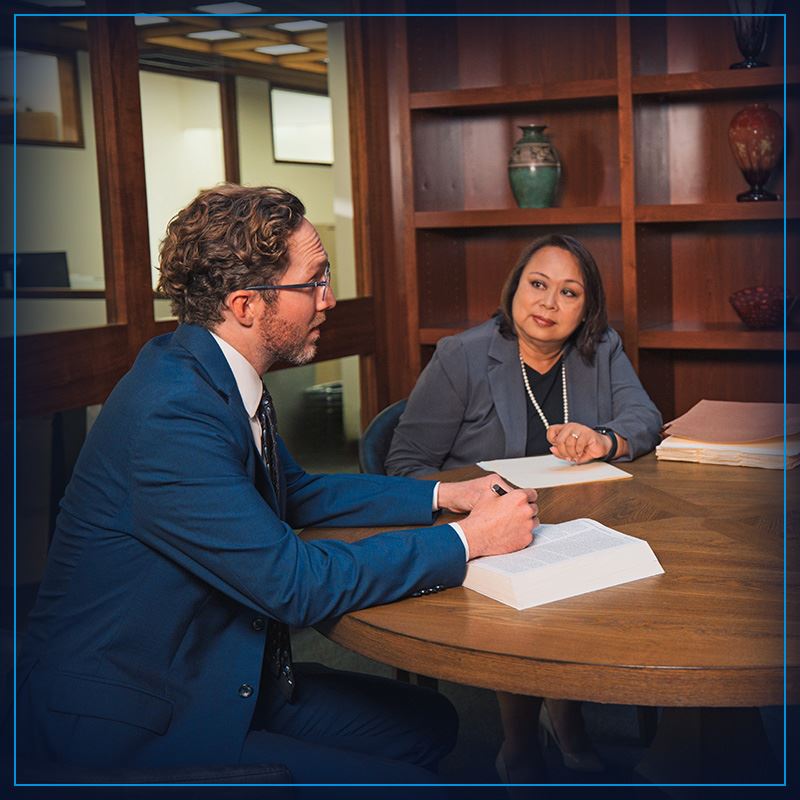
HAWAII NURSING HOME ABUSE ATTORNEYS
OVER 40 YEARS OF LEGAL EXPERIENCE
Your elderly loved ones are some of the most vulnerable people in your life. When you entrust an assisted living facility or nursing home to care for an elderly family member, you expect them to provide the kindness your loved one deserves. This is especially true when you consider the cost of a nursing home facility in Hawaii; one year in a semi-private room costs almost $120,000.
If you suspect that your loved one is the victim of nursing home abuse or neglect, an attorney with experience in nursing home abuse claims may be able to help you secure compensation for damages, such as medical bills, pain and suffering, and more.
Contact Davis Levin Livingston at (808) 740-0633 for a free consultation with an experienced Hawaii nursing home abuse attorney. We serve clients in Honolulu and all the Hawaiian Islands.
Understanding Nursing Home Abuse
According to the American Health Care Association, approximately half of U.S. Citizens will be nursing home residents at some point in their lives. This means that nearly everyone will put his or her faith in an assisted living facility or nursing home to care for an elderly loved one or friend.
Large franchises own over half of the nursing homes in the nation. Two-thirds of the nation’s nursing homes are being operated as for-profit businesses.
Although there are state and federal regulations (Nursing Home Reform Act of 1986) put into place to protect nursing home residents, the unthinkable still occurs. These gross violations compromise the well-being, health, and dignity of some of this nation’s most vulnerable citizens.
Many times nursing homes have insufficient staff that is poorly trained which can lead to:
- Residents being victimized by staff members and/or other residents
- Fraudulent activity
- Theft from residents
- Residents suffering from malnutrition
- Resident mistreatment and abuse
- Inadequate medical care
- A lack of social services
Many times the abuse or neglect of nursing home residents occur with no intervention. Due to medical complications, such as dementia and Alzheimer’s, detecting abuse can be challenging. Additionally, those patients who are not suffering from dementia or Alzheimer’s may not report abuse or neglect because they fear the retaliation they may encounter or they may not want to burden their loved ones.
Nursing Home Abuse Comes in Many Forms
Nursing home abuse can be extreme or subtle. An attorney is aware of this and knows what to investigate. Nursing home abuse can take the form of assault, battery, or even rape. Improper use of restraint is another form of abuse. This occurs when nursing home staff either forcefully restrains a resident or chemically subdues them, such as with the use of unauthorized prescription drugs or dosages.
Nursing home abuse can also be emotionally devastating. Insults and threats are common, but just as damaging is isolating or ignoring residents. Regardless of the form, nursing home abuse is extremely devastating to your loved one and can be life-threatening.
Examples of types of nursing home abuse include:
- Physical Abuse: At first glance, it appears that Hawaii has something to be proud of when it comes to taking care of nursing home residents. While across the U.S. there is a 30% citation rate from the Centers for Medicare and Medicaid Services (CMS), in Hawaii the citation rate is only 4%. Unfortunately, this statistic is deceiving. The reason why it is so low is that the Hawaii Long Term Care Association does not necessarily report all incidents of physical abuse. Representatives from the organization have indicated that they prefer to focus on preventing future incidents unless a facility shows “a willful and ongoing disregard” of a resident’s care and safety. With this policy, many caregivers who have abused, beaten, neglected, and taken advantage of nursing home residents go right back to having contact with them.
- Sexual Abuse: Many times, nursing home employees, volunteers, physicians, and nurses have sexually abused elderly residents of nursing homes because they perceive them to be weak and defenseless. You and your elderly loved ones shouldn’t have to worry about their safety as a resident of a nursing home. It’s up the nursing homes to do proper background checks on their employees to prevent sexual abuse. If you believe your loved one has been a victim, contact our Hawaii nursing home abuse attorneys today.
- Financial Abuse: Financial abuse of the elderly population is on the rise. Family members are the most common perpetrators, but nursing home employees can take advantage of elderly residents as well. Those who intend to defraud, steal, or manipulate the elderly for their financial gain should be reported to the proper authorities. Our attorneys may help regain some of what has been taken.
Nursing Home Neglect
When an individual’s personal hygiene is neglected, illness and/or infection can set in. Personal hygiene includes:
- Oral hygiene
- Bathing
- Grooming
- Clean and comfortable clothing
Nursing home neglect can also involve withholding basic needs. If a resident’s basic needs are not met, he could suffer dehydration, malnutrition, and other serious injuries.
Basic needs include:
- Water
- Food
- A safe environment
If an individual is neglected medically, his overall health may decline. Medical neglect includes:
- Over-medicating
- Under-medicating
- Withholding medical treatment for an injury or condition
Common Signs of Nursing Home Abuse
Neglect of nursing home residents is frequently overlooked, which many times results in the decline of an individual’s general health and can eventually lead to death. This problem occurs everywhere and takes on many different shapes. When loved ones do not know what to look for, abuse and neglect can remain hidden for extensive periods of time. There are numerous signs that you can look for to determine whether your loved one is being abused or neglected.
Nursing home neglect is not always obvious and may have taken place over a long period of time. Sometimes, efforts are made to hide the fact that abuse or neglect is occurring.
The signs to look for include:
- Open wounds
- Bed Sores
- Choking
- Physical restraints
- Unkempt appearance
- Soiled bed sheets, clothing or a dirty room
- Clogged breathing tubes
- Unexplained bleeding and/or visible injuries
- Malnutrition/weight loss
- Dehydration
- Bruises
- Wandering
- Broken bones, fractures
- Unexplained behavior changes
- Staff refuses unsupervised visitation
- Loss of your loved one’s possessions and/or unexplained bank activity
- Sudden changes in his financial documents
- Emotional withdrawal
- Sudden agitation
If your loved one’s caretaker is unable to sufficiently explain the reasons for his condition, you may want to meet with an attorney to explore your options.
Reasons Why Even the Best Hawaii Facilities Can Have Nursing Home Abuse
When you look for a nursing home for your loved one, chances are, you’re going to only want the best choices possible. While it is normal to look for up-to-date, modern facilities and staff members who conduct themselves professionally, unfortunately, no facility is completely immune to the risk of nursing home abuse.
Some of the factors that may make it difficult to predict or even spot nursing home abuse include:
Management
The management knows there is a problem at the nursing home but may be instructed by owners to skim expenses by cutting training procedures or avoiding hiring new employees. When those who run facilities actively try to cover up problems that can result in abuse, it may be harder to recognize warning signs during visits.
Mentality
Many of the residents currently in nursing homes could very well be victims of nursing home abuse but because of the generation in which they grew up (Great Depression, WWII) have been taught to deal with problems on their own or to just press on.
Inability
When staff unfairly isolate residents, threaten or verbally abuse them, you may not be able to see physical signs of a struggle. When you couple this with the fact that many residents suffer from severe illness or problems such as dementia, they may not even be able to coherently speak up for themselves or articulate the abuse they are suffering.
The signs of nursing home abuse can be subtle and masked in spotless hallways, expensive facilities, and crisp uniforms but its effects are no doubt devastating. If you have suspicions of nursing home abuse, even in a seemingly impeccable facility, an attorney can help you get to the bottom of the matter. When necessary, you may find that protecting the well being of your loved one involves filing a Hawaii nursing home claim.
Contact Davis Levin Livingston
If your loved one is a nursing home resident and shows any of the signs listed above, you need to contact an experienced nursing home attorney. You can help give your loved one back his dignity and make the conditions safer for the other residents in the facility.
We have put together a comprehensive list of resources for Hawai’i’s elderly community.
For more information, or to schedule a free consultation with an attorney at our firm, contact Davis Levin Livingston online or by phone at (808) 740-0633 today.


Four Decades of Record Breaking Victories
-
$104,000,000 Child Sex Abuse
We're proud to have secured a landmark $104 million settlement for victims of abuse against Kamehameha School. This ground-breaking case marks a significant victory for the victims, with the school agreeing to settle.
-
$29,400,000 Medical Malpractice
Physicians at Tripler Army Medical Center failed to order a crucial test that would have detected a twisted gut in a 1-month-old baby, resulting in the loss of 95% of the baby's small intestine and leading to lifelong disability.
-
$15,400,000 Wrongful Death
The state has agreed to a $15.4 million settlement in a civil lawsuit filed by the families of two hikers who fell to their deaths on a Kauai hiking trail in 2006.
-
$15,000,000 Vacuum/Forceps Injury
The hospital improperly attempted to deliver a post-date baby using a traumatic second-stage vacuum extraction. This extraction and the delay in delivery resulted in permanent brain damage to the baby.
-
$9,975,000 Brain Injury
The hospital's failure to monitor an infant's rising bilirubin levels led to bilirubin encephalopathy and kernicterus, resulting in severe and permanent brain damage. A settlement of $9,975,000 was obtained.
-
$9,500,000 Medical Malpractice
Surgeons at Tripler Army Medical Center reattached the small intestine backward during gastric bypass surgery, leading to complications that ultimately resulted in the death of a 31-year-old Army wife and mother of three.

Why Davis Levin Livingston?
-
Available by phone 24/7 & ready to help.
-
Secured tens of millions of dollars on behalf of our clients.
-
Highest malpractice judgment in U.S. history against a military hospital.
-
Includes an experienced medical team including a nursing staff to answer your questions.
-
Mark Davis and Mike Livingston have been recognized as some of the best lawyers in Hawaii.
-
Resources available to advance your expenses; no cost or fees unless Davis Levin Livingston wins your case.

Dedicated Legal Counsel You Can Count On
Helping Families throughout hawaii for over 40 years
-
"Professional, KIND, and understanding"
They are most professional, KIND, and understanding. Thank you Matt Winter for all your help.- Clare T. -
"We wouldn't have chosen any other team!"
Mathew Winter and the whole staff of Davis Levin Livingston guided us every step of the way and made sure we understood everything that was going on. They were always so welcoming and compassionate. Communication was never a problem and emails were answered super fast, especially when we had so many questions. They- Maariel -
"The absolute best firm in Hawaii. Compassion and professionalism at its best!"
Truly a wonderful experience with everyone at the firm. I can't thank you enough for helping provide closure for my family and me during this process. The absolute best firm in Hawaii. Compassion and professionalism at its best!- Daniel -
"After doing extensive research I knew that Davis Levin Livingston was the firm for me due to the success they have had in cases like mine."
After doing extensive research I knew that Davis Levin Livingston was the firm for me due to the success they have had in cases like mine. What surprised me was their personal touch. In the 3- Anthony






.1).1).2401101010550.png)





.1910211111556.png)

.1).1910211114162.png)
.1910211111550.png)